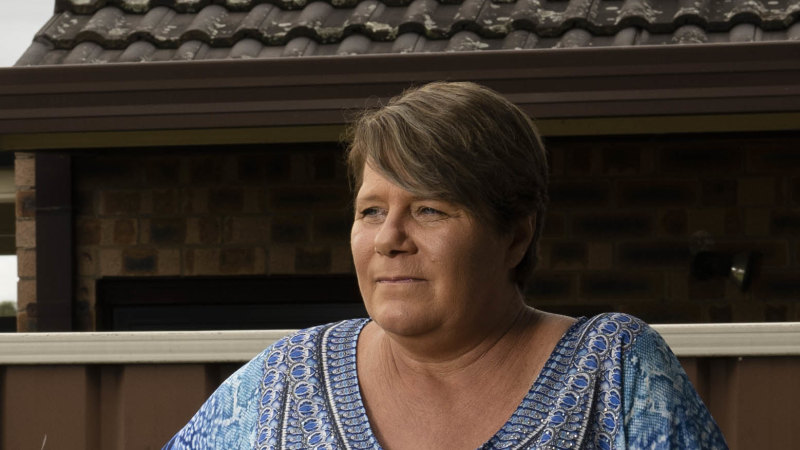Hundreds of Australian women who underwent a contraceptive procedure touted as a “radical breakthrough” in birth control endured such severe side effects they underwent hysterectomies, according to lawyers representing them.
The Essure device was said to be a “gentler” sterilisation method for women who had finished having children. A metal coil was inserted in each fallopian tube, creating scar tissue that blocked the tube, in a bid to prevent pregnancy.
Jackie Sacqualini is part of the class action against the companies involved in the design, development or manufacture of the Essure device.Credit: Janie Barrett
Clinical trials would conclude that the procedure was effective, safe and had high rates of comfort.
But on Tuesday a class action representing about 1000 Australian women who say they were harmed by the Essure will go before the Supreme Court of Victoria.
One Australian woman fitted with the coils as part of a trial has told The Age and Sydney Morning Herald that her notes reporting severe levels of pain were altered.
Sydney mother-of-four Jackie Sacqualini claims she was “often” or “regularly” encouraged by a researcher to approve changes to her pain diaries for the year after she underwent the Essure sterilisation procedure, then known as STOP.
For example, pain scores of between eight and 10 out of 10 were reduced to five or six, she said.
“She [the researcher] used to say to me all the time ‘I know how tough you are. C’mon, I know you’. And I would think ‘OK, look, maybe I was having a bad day and maybe it was only a five or six’. And then she would change it in the diary, and get me to initial it.”
Within hours of being fitted with the Essure, in November 2000, Sacqualini, who had the coil on her left side removed in 2020, remembers being on the bathroom floor passing giant blood clots, about the size of a cigarette packet.
“I was in that much pain, I thought my uterus was inverting,” she said. “I thought I was bleeding to death.”
In the following years, hundreds of thousands women worldwide were implanted with the device, which was first manufactured by a company called Conceptus Inc. Conceptus was bought by pharmaceutical multinational Bayer in 2013.
Accounts of the implant piercing the womb or breaking, metal poisoning, extreme hair loss, chronic pain, fatigue and bleeding, repeated miscarriages and pregnancies and a feeling of despair are among the many dozens of adverse event reports lodged with Australia’s medical devices regulator.
Slater and Gordon Lawyers is representing about 1000 women in the court action against Bayer and other related companies.
Because the procedure was irreversible, more than half of these women had to resort to hysterectomy (removal of the uterus) or a salpingectomy (removal of fallopian tubes) to get the device out of their bodies, according to the law firm. The remaining women plan to have the device removed.
While Bayer paid out about $2.4 billion to settle lawsuits in America, the company continues to deny there were widespread problems with Essure. In a statement, a spokesperson said the company had confidence that the evidence in the upcoming Australian case would demonstrate it was not responsible for the alleged injuries.
“Bayer stands behind the safety and efficacy of Essure which is supported by an extensive body of research (including 10 clinical trials and over 70 real-world observational studies), undertaken by Bayer and independent medical researchers, involving more than 270,000 women over the past two decades,” they said.
“It is important to understand that adverse reports do not make any determination or conclusion about whether a medical device had any relationship to, or caused, the injury.”
Kylie Trounson, a senior associate with Slater and Gordon, said the initial clinical trials concentrated on whether the device was effective to prevent pregnancy and were not sufficiently focused on whether the device was safe.
Trounson said Essure underwent no randomised controlled trial, “the gold standard for testing medical devices”, and it was released to the market in Australia before sufficient long-term data on its safety was available.
She said that for a device that you could only remove by taking out a woman’s organs, this was unacceptable.
Monique Emmett said she suffered extreme pain after she was fitted with the Essure contraceptive device. This picture was taken after it was removed.
“We question why it was developed in the first place.”
Monique Emmett, from Yarrawarrah in Sydney, said after she was fitted with the Essure in 2007 following the birth of her third child she was in so much pain she was sometimes unable to walk.
“I would have to crawl if someone was at the front door because I just couldn’t get up,” Emmett recalled.
Emmett, now 43, said she endured such heavy bleeding she was unable to leave the house some days and would go through an entire box of heavy-duty tampons in an hour. She had no sex drive, lost a lot of hair, developed severe depression and her marriage broke down.
It wasn’t until 2020 when she had her fallopian tubes containing the Essure devices removed, that the worst of her symptoms disappeared.
“I don’t have brain fog. I haven’t had migraines, I can help my children … take them to sport and run around. I feel like I’m a completely different person,” Emmett said.
“But to get to that point that you’ve got to get body parts taken out, that’s not right.”
A hazard alert was issued by the Therapeutic Goods Administration related to the Essure in 2017 after a study ordered by the US Food and Drug Administration found that patients tended to have a higher rate of pain and abnormal bleeding compared to those who had their tubes tied.
But for many Australian women, it wasn’t until later, when they heard about legal action in the media, or joined social media groups, that they came to learn other women fitted with Essure were also complaining of side effects.
Allison Rosier says she feels like a new person after having the Essure removed.
In 2018, after almost a decade trying to get answers from doctors about what could have been causing her crippling pain and fatigue, Tasmanian mother-of-two Allison Rosier was startled to see a television segment about the Essure class action.
In 2009, the energetic hairdresser said she had been sold Essure as a less invasive option to having your tubes tied, otherwise known as tubal ligation. She would be quickly back on her feet, she was told, an attractive proposition for someone running their own salon.
“A year after that I was getting this excruciating bloating and pain in my abdomen. I was swelling up and not being able to stand on my feet for the whole day… The bleeding was through the roof. I couldn’t even sleep.”
Rosier received a hysterectomy to remove the coils in 2018. She said life is so much better now, but she feels robbed of the lost years when her children were young.
She recently found a Mother’s Day card written by one of her sons when he said that he loved her, and he knew that she loved shopping and sleeping.
“It crushed me,” she said. “For me to be bedridden, to not be able to function for a full day, to not be there for my children. I will never, ever forget it.”
The Morning Edition newsletter is our guide to the day’s most important and interesting stories, analysis and insights. Sign up here.
Most Viewed in National
From our partners
Source: Read Full Article





